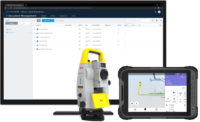The following is just a brief sampling of the topics that were discussed in New Jersey. A full report, with extended details on each topic, will be published in future print and online editions of Stone World.
How can you expand your business?
"You have to define what you mean by expanding," said Tony Malisani of Malisani, Inc., and Secretary of the Marble Institute of America, who led the session. "Are you expanding capacity? Are you expanding hours? Are you investing in equipment? You need to put an actual number on what you want to achieve. It isn't an emotional decision of 'I just want to be bigger.' You need to think in terms of numbers. For example, 'If I grow 10% in volume, I would gain X.' You need to commit to a number and assign a value to it. If you commit to a number, you will do what it takes to make it work, and there are different ways of getting there.
"You also need to look five or 10 years down the road, and think of where you want to be," Malisani continued. "For us, we made a commitment to work with specifiers. Our company moved into terrazzo work, and we promoted to the architectural and design community. I am in an unusual situation, being in Montana with a low population, and we developed a reputation. We promote our background and our experience. You have specifiers looking to you for information."
A number of fabricators in attendance said that they have expanded into customized, high-end stonework to get more value-added work from their customers. "Most people got into this business thinking that the market was only countertops, and for a decade and a half, it was," said one fabricator. "But now, if you walk into our shop, we are doing a lot of other work. Countertops are only a small part of it."
How can you better manage your business?
"Think of what is important to your success," Malisani said. "Not every plan is right for every company. You need to think of where you want to be, and what you want to do. Are you a small, custom shop, or do you want to be a volume shop?"
One fabricator in attendance explained that he hired an administrator, and the added cost was more than offset by the fact that, as an owner, he was now free to increase revenue and expand the operation -- something he was not able to do in the past. Other fabricators at the event also offered specifics on how they changed their management style in the face of a changing marketplace.
What about marketing?
"You want to create a brand, but the brand needs to fit your business," Malisani explained. "You can't be a high-end shop and also the $39.99-per-foot shop at the same time. Do some research to determine what the strengths of your company are, and how you want to market them.
"You also need to think about what type of marketing your clients will respond to," Malisani said. "Everyone has a Web site, but if you have commercial clients, how important is your Web site going to be to your marketing plans?"
Does it make sense to import directly?
Answers on the topic were mixed, with about one-third of attendees stating that they import directly, but they stressed that it was critical to build relationships with overseas suppliers before diving straight in.
A number of the fabricators who are importing said they are bringing in less material from overseas, due to improved cost and selection at area distributors. "I went from importing 60 containers per year to around 10 now," said one attendee. Another cited the costs associated with maintaining his own inventory.
How are you dealing with the new technology in the marketplace?
Once again, Malisani stressed the importance of building relationships with technology suppliers. "Nothing is going to work perfect every time," he said. "You need to find suppliers that you can work with. You need to be comfortable with the equipment, but also with the service you are getting. Also, you need to keep in mind that you will likely have to buy more equipment down the line."
Are you conducting regular meetings with your employees?
Most of the fabricators in attendance reported that they are participating in regular meetings on sales, general shop operations, and in particular, safety. "We have regular safety meetings, and we go through the Marble Institute of America safety materials," explained Jon Mitnick of CCS-Stone, who has been working in the industry for more than two decades. "You really need to be prepared when it comes to safety. Then if you get a visit from OSHA, you are ready, and you can document everything."
Following the collaborative session on managing a business, an afternoon Fabricator Forum was moderated by Malisani, and had a panel of three industry veterans.
Linda Stelmaszyk of Stoneshop in Cherry Hill, NJ
Buddy Ontra of Ontra Stone Concepts in Bridgeport, CT
Marco Duran of Atlas Marble and Granite in Newark, NJ
The panel and audience addressed some of the practical issues faced by today's fabricators. They included:
- Technical processes for working with quartz surfacing
- Working with exotic materials
- Working with white marble
- Laminating
- Templating (physical and digital)
The event also had ample opportunity for networking among the fabricators and sponsors -- suppliers of machinery, tooling, software, templating equipment and other technology. A tour of IGM's warehouse and materials was also a highlight of the event.
At a time when it is easy to become disenchanted with the current business climate, it is a breath of fresh air to see a collection of industry veterans take a moment to network, share information and collaborate to advance our industry as a whole.
These MIA/Stone World events take place year round across North America, and if you haven't been to one (or even if you have), I strongly encourage you to check one out in the future. Like our industry, the topics are always changing, and I guarantee you will take something away from it.
The next event will take place in Dallas, TX, on November 8, 2012.
Learn more at www.stoneindustryeducation.com.










